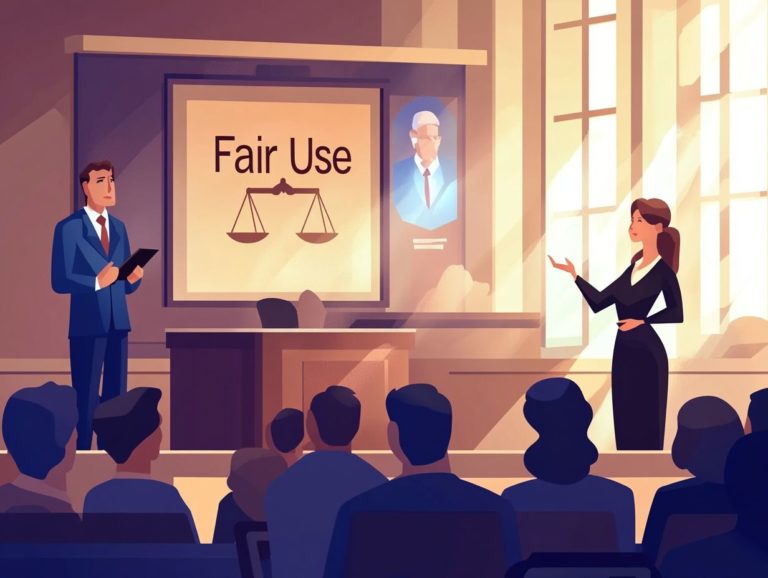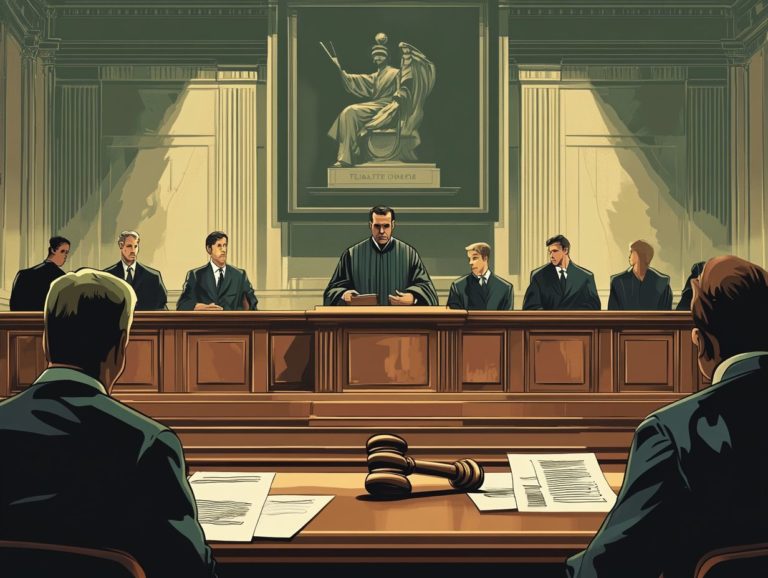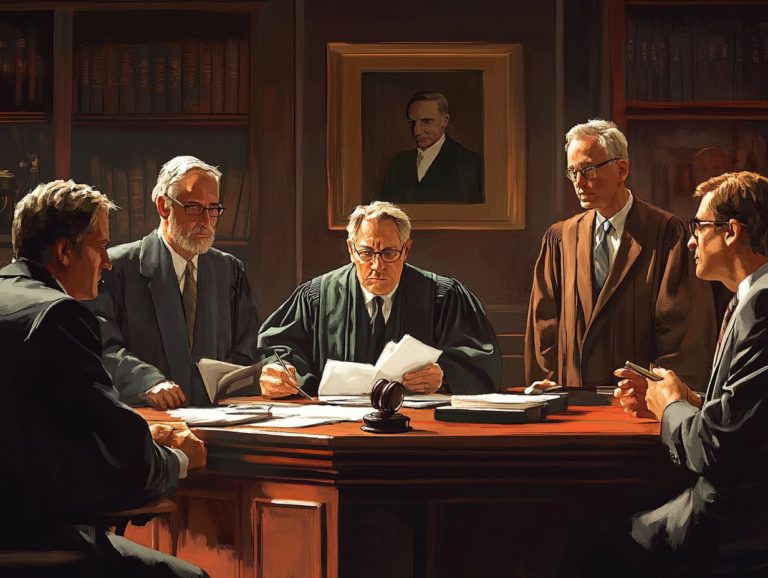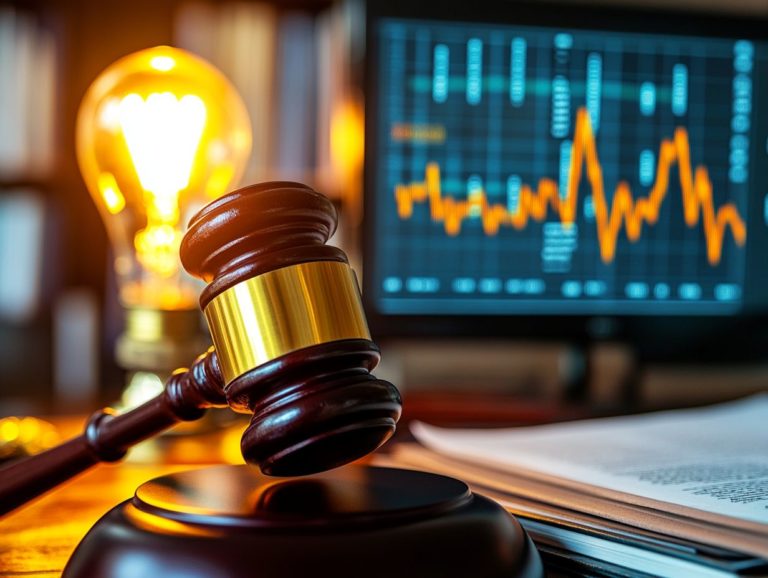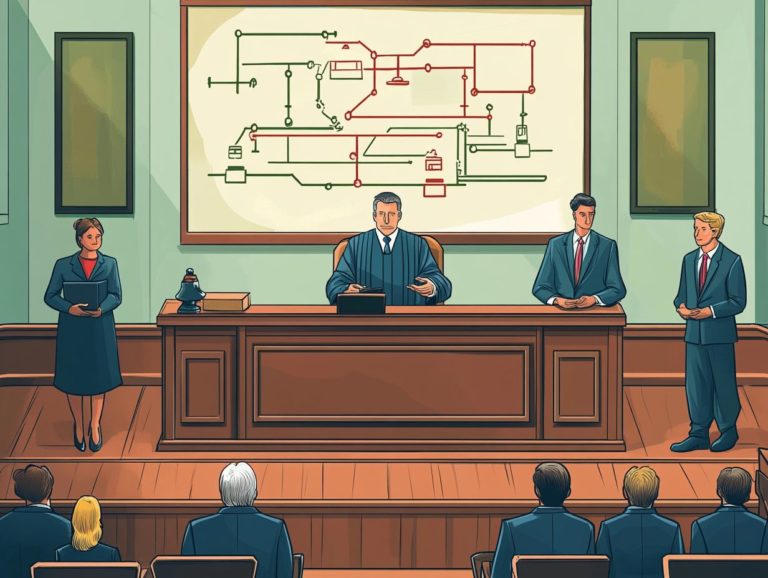5 Factors Influencing the Outcome of IP Litigation
Intellectual Property (IP) litigation is a complex area that can profoundly affect the success and longevity of your business.
Understanding the strength of your IP rights and identifying evidence of infringement can be pivotal in court.
This guide delves into five essential factors that influence the outcome of IP cases, providing you with insights into legal strategies, potential costs, and effective defenses.
Whether you’re a seasoned entrepreneur or an emerging innovator, this resource will empower you with the knowledge needed to navigate the complexities of IP litigation with confidence.
Contents
- Key Takeaways:
- 1. Strength of Intellectual Property Rights
- 2. Evidence of Infringement
- 3. Legal Team and Representation
- 4. Court Jurisdiction and Venue
- 5. Impact of Precedent Cases
- How Can a Business Prepare for IP Litigation?
- Frequently Asked Questions
- What are the 5 factors that can influence the outcome of IP litigation?
- How do strong IP rights affect litigation outcomes?
- Why is evidence crucial in IP litigation?
- How does legal strategy impact litigation results?
- Why does the legal team’s expertise matter?
- Can the judge or jury influence litigation results?
Key Takeaways:
- Define and protect your IP rights today!
- Gather and preserve strong evidence to support your case.
- Hire experienced attorneys with a track record of success.
1. Strength of Intellectual Property Rights
Protecting your ideas is vital! Strong IP rights enable people with patents to enforce exclusive rights and prevent unauthorized use of inventions across various jurisdictions, including the US and UK.
This framework incentivizes creators to push the boundaries of creativity while cultivating a fair marketplace where original ideas can flourish without the threat of imitation.
For example, patents grant exclusive rights to technological advancements for a specified period, while trademarks protect brand identity, preventing consumer confusion. Copyrights ensure rightful compensation for artistic creations.
Weak IP protections can stifle innovation, allowing counterfeiters to thrive, ultimately harming both creators and consumers. Strong IP laws encourage investment in new ideas, benefiting society while enhancing potential for success.
2. Evidence of Infringement
Evidence of infringement is crucial in patent litigation. It must clearly showcase instances of direct, indirect, or contributory infringement to bolster your claims in court.
During the discovery phase, gather a wealth of evidence, including documentation like patents, product specifications, and sales data, as well as witness testimonies that can clarify how the alleged infringement took place.
Expert evaluations delve into the complexities of the technology at hand, ensuring that no critical nuances are overlooked. An expert witness meticulously analyzes the evidence, leveraging specialized knowledge to present findings clearly.
This process adds credibility to your case and clarifies the intricacies of the infringement allegations for the court.
3. Legal Team and Representation
Having a skilled legal team is crucial for navigating the intricate world of patent litigation. Experienced legal counsel can craft effective settlement strategies and guide you through various phases, including mediation with neutral parties.
Choosing the right legal counsel with expertise in patent law can shape the path of your case, ensuring that the complexities of IP protections are managed with precision.
Attorneys assess the strengths and weaknesses of your patent claim, while mediators facilitate discussions aimed at achieving mutually beneficial agreements. They utilize strategic approaches tailored to your situation.
By harnessing their legal acumen and industry insights, they help you avoid potential pitfalls and strive for favorable outcomes, safeguarding your valuable innovations and securing essential rights.
4. Court Jurisdiction and Venue

Understanding court jurisdiction and venue is essential in patent litigation. The choice of where to file can significantly influence the outcome of your legal proceedings, especially when navigating the complexities of Federal Courts, the Supreme Court of Canada, or patent offices such as the UK IPO and USPTO.
Several factors shape jurisdiction. These include the location of the allegedly infringing activities and the jurisdiction where the patent holder resides. If infringement occurs in a specific district, that location may be more advantageous for you as the plaintiff to initiate a suit.
The differing interpretations of patent laws by various courts can dramatically impact your litigation strategies. Being aware of the pitfalls in IP litigation to avoid is crucial, as some jurisdictions are known for being more plaintiff-friendly, influencing your venue selection and broader strategic decisions regarding whether to settle or vigorously pursue your claims.
5. Impact of Precedent Cases
The impact of precedent cases in patent litigation is immense. These cases shape the legal landscape and guide appellate courts in determining outcomes related to legal actions, potential damages, and invalidity claims against patents.
Landmark decisions serve as vital references for practitioners and judges navigating complex legal disputes. For example, cases like eBay Inc. v. MercExchange, L.L.C. have fundamentally transformed how courts approach injunctions, making it more challenging for patent holders to secure immediate relief.
Furthermore, the Supreme Court s ruling in Halo Electronics, Inc. v. Pulse Electronics, Inc. has dramatically influenced how enhanced damages are assessed in cases of willful infringement.
As these precedents redefine standards, they set clear expectations for current litigation. This impacts your strategies regarding infringement claims and liability assessments, guiding how industries innovate and protect their intellectual property.
How Can a Business Prepare for IP Litigation?
Preparing for IP litigation requires careful planning. Engage legal counsel and use competitive intelligence to assess your position, manage litigation costs, and navigate potential challenges, including insights from the 5 future predictions for IP litigation.
Once you’ve conducted this assessment, thoroughly review your intellectual property portfolio to identify any vulnerabilities that could be exploited during a legal challenge. Researching patent databases can provide invaluable insights into existing patents and potential infringers, allowing you to craft a more informed strategy.
Develop a proactive legal strategy with clear objectives and contingency plans. Budgeting for legal fees is crucial, as litigation can be unpredictable and financially burdensome.
Understanding the intricacies of the litigation process will enable you to approach disputes with confidence and clarity. Act swiftly to protect your intellectual property!
What Are the Common Defenses Against IP Infringement?
Challenging the validity of patent rights and countering claims with evidence of unjustified threats are common defenses against IP infringement. You can present these strategically with the help of legal counsel to mitigate the impact of an infringement lawsuit.
Invoking prior art can be a game-changer, as it shows that the claimed invention lacks novelty or inventiveness. You can also take advantage of the fair use doctrine, which allows limited use of copyrighted material without permission in certain cases.
By incorporating these defenses, you can protect your assets and lower the chances of unfavorable rulings. Understanding these options enables you to navigate potential legal challenges with finesse, bolstering your position in negotiations and ensuring robust protection for your intellectual property.
What Are the Factors That Can Strengthen an IP Case?
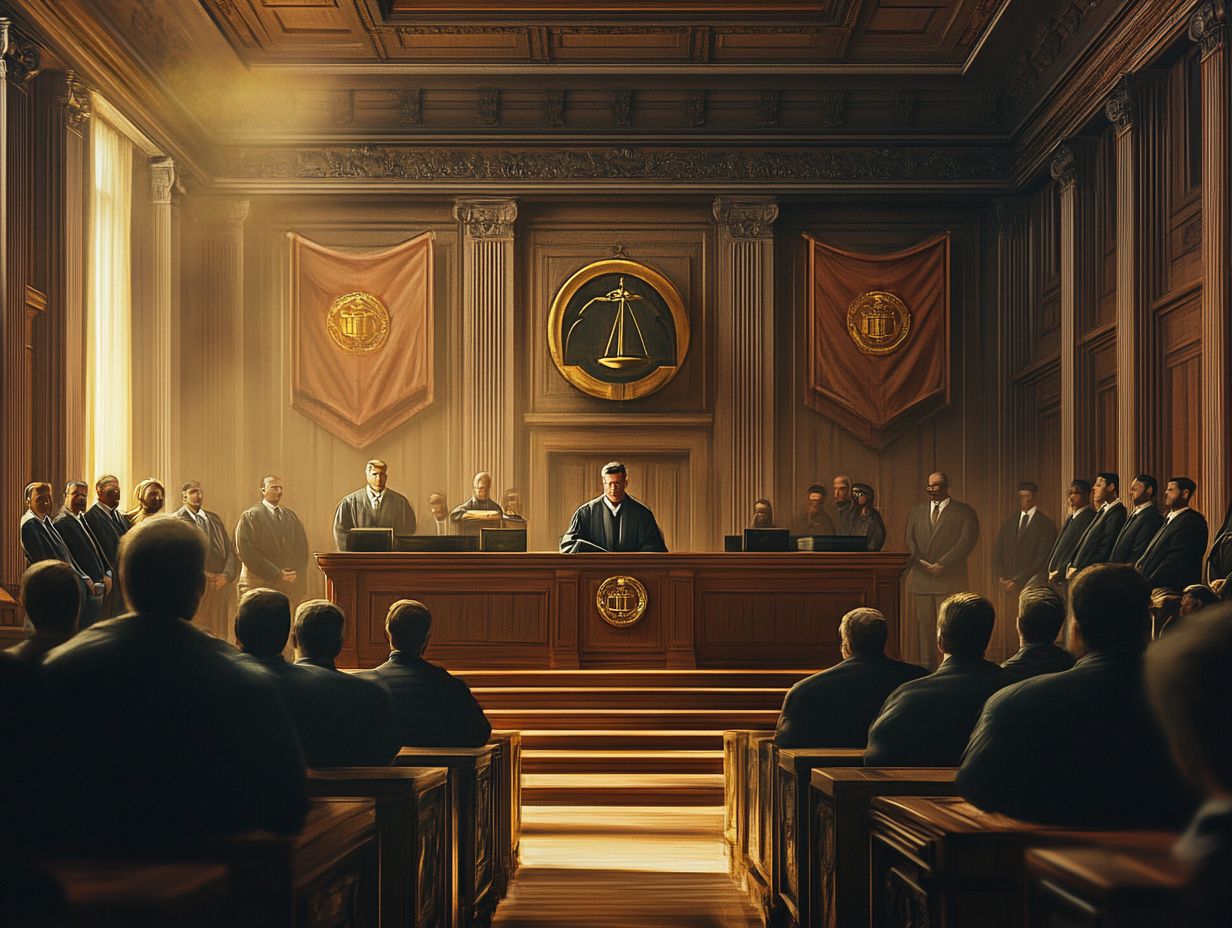
Several factors can significantly strengthen your IP case. These include robust evidence of infringement, the credibility of expert witnesses, and legal expertise in IP litigation, particularly in patent prosecution.
By carefully assembling these components, you can craft a compelling argument in court. For instance, imagine a software company successfully defending its patent against copying; the presence of comprehensive technical documentation and independent analyses played a crucial role in their victory.
Well-regarded experts provided insights on the technology involved, enhancing the case’s credibility. A similar scenario unfolded in a trademark dispute, where the clarity and consistency of brand usage data solidified the claim of infringement.
The effective integration of strong evidence and authoritative testimony does more than just fortify your argument; it can significantly influence the overall outcome of IP litigation.
How Can a Business Protect Their Intellectual Property Rights?
To safeguard your intellectual property rights, take proactive measures. This includes securing patents, checking regularly, and keeping an eye on competitors to monitor potential threats and infringements.
Besides these essential steps, establishing a robust legal framework is vital. Engaging experienced legal counsel who specializes in intellectual property law provides ongoing support and expert advice.
These professionals can help you navigate the complexities of IP rights, clarifying trademark registration and copyright enforcement. Fostering a culture of vigilance within your organization helps employees identify potential risks.
This ultimately protects the creativity and ingenuity that drive your business success.
What Are the Potential Costs of IP Litigation?
Be prepared! The potential costs of IP litigation can add up fast. Expenses include legal fees, expert witness charges, and other litigation costs that can escalate significantly. To better understand these challenges, consider the key takeaways from recent IP litigation cases.
These costs may begin to accumulate even before you file your initial claim. Businesses often invest in preliminary research and consultations to assess the strength of their case.
As the proceedings unfold, you’ll typically face extensive discovery costs involving document exchanges, depositions, and expert evaluations.
To navigate these financial challenges effectively, devise a comprehensive budget. This budget should account for direct legal fees and potential settlement costs.
By evaluating past cases and gleaning insights from industry trends, you can better allocate resources and mitigate the financial risks associated with intellectual property disputes. Additionally, exploring 5 ways to leverage IP rights in litigation can further enhance your strategy.
What Are the Alternatives to IP Litigation?
Explore now alternatives to IP litigation, such as judicial mediation, a process where a neutral third party helps settle disputes. Engaging a private mediator can equip you with effective settlement strategies.
By choosing these avenues, you can uncover tailored solutions, often leading to quicker resolutions and preserving vital business relationships.
For example, mediation has successfully facilitated settlements in numerous intellectual property disputes. It enables parties to reach mutually beneficial agreements without the adversarial nature of court proceedings.
This approach saves on legal fees and minimizes the time spent in litigation, allowing you to allocate valuable resources to other business initiatives.
By embracing these alternative methods, you often find a more amicable path forward, fostering collaboration rather than conflict.
Frequently Asked Questions
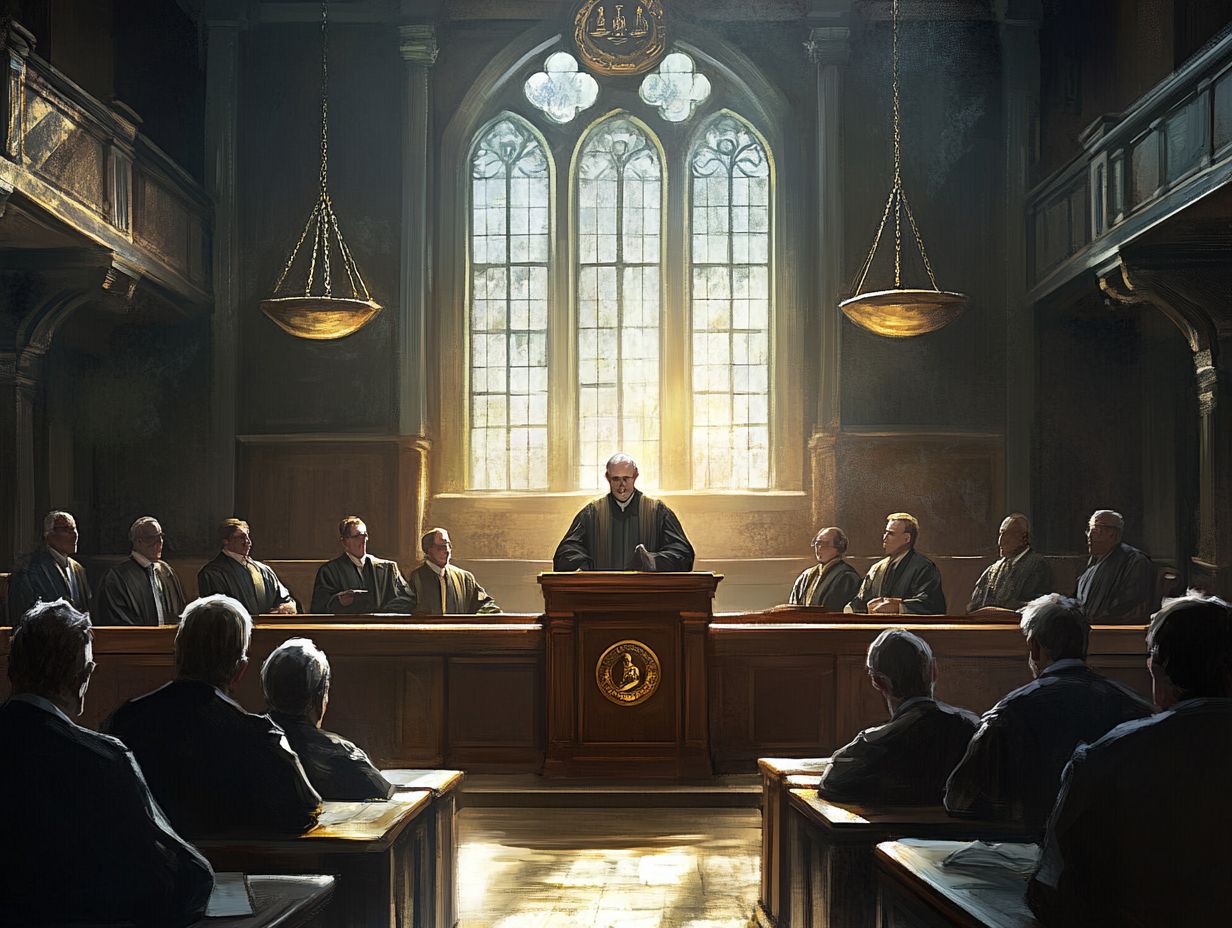
What are the 5 factors that can influence the outcome of IP litigation?
The 5 factors that can influence the outcome of IP litigation are the strength of the IP rights, the evidence presented, the legal strategy adopted, the expertise of the legal team, and the judge or jury presiding over the case. To delve deeper into these elements, consider exploring 5 key strategies for successful IP litigation.
Take proactive steps in protecting your IP rights!
How do strong IP rights affect litigation outcomes?
Strong intellectual property (IP) rights mean better protection and validation. When they are strong, the outcome is usually favorable for the IP owner.
Why is evidence crucial in IP litigation?
Evidence is vital because it supports the claims from each party. Solid evidence can influence the decision significantly.
How does legal strategy impact litigation results?
The legal strategy of each party plays a crucial role. A well-planned strategy can enhance the likelihood of success.
Why does the legal team’s expertise matter?
The expertise of a legal team is essential in IP cases. An experienced team can effectively defend their case, especially when considering key factors in IP litigation, improving the odds of a favorable outcome.
Can the judge or jury influence litigation results?
Yes, the judge or jury can greatly impact the outcome. Their understanding of the law and potential biases can affect their decisions, making it crucial to have knowledgeable and impartial individuals involved.

